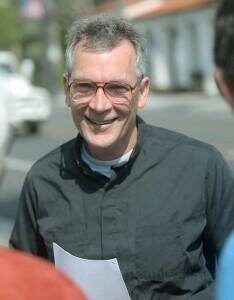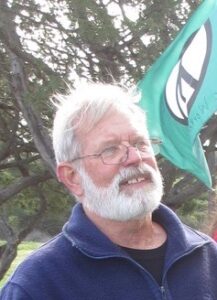 On October 15, Fr. Steve Kelly, S.J. was sentenced to 33 months in prison for his part in the Kings Bay Plowshares nuclear disarmament action of April 2018. Federal judge Lisa Godbey Wood also ordered that Kelly pay restitution of $33,503.51, jointly and severally with his six codefendants, and a special assessment of $310. Recognizing the Jesuit priest’s indigence, the court waived any fine and interest payments on the restitution. Three years of supervised probation will follow his prison term, with the conditions that Kelly must surrender all financial information requested by the probation office, make no applications for credit, and cooperate with submitting a DNA sample.
On October 15, Fr. Steve Kelly, S.J. was sentenced to 33 months in prison for his part in the Kings Bay Plowshares nuclear disarmament action of April 2018. Federal judge Lisa Godbey Wood also ordered that Kelly pay restitution of $33,503.51, jointly and severally with his six codefendants, and a special assessment of $310. Recognizing the Jesuit priest’s indigence, the court waived any fine and interest payments on the restitution. Three years of supervised probation will follow his prison term, with the conditions that Kelly must surrender all financial information requested by the probation office, make no applications for credit, and cooperate with submitting a DNA sample.from The Atlanta Journal-Constitution
Before his sentencing Thursday, Father Steve Kelly, a Jesuit priest and prolific anti-nuclear weapons activist who has been arrested numerous times, told the court he would refuse to pay any restitution or follow any probation rules. Instead, he asked the judge to give him extra prison time.
Kelly was one of seven Catholic activists from around the U.S. who broke into Naval Submarine Base Kings Bay, near Cumberland Island in coastal South Georgia, in April 2018. They hung banners, defaced signs and spread human blood to call for worldwide disarmament by “symbolically disarming” the facility. The activists believed nuclear warheads were stored at the facility. The government has declined to confirm or deny it.
Kelly, 71, who has spent more than a decade in jails and prisons for protests around the United States, was sentenced to 33 months in federal prison for conspiracy, destruction of federal property, destruction of naval property and trespassing. U.S. District Court Judge Lisa Godbey Wood gave him credit for the time served since his arrest hours after the break-in, meaning he has only a few more months behind bars.
“I am a political prisoner,” the priest said in a statement to the court.
The judge also gave Kelly three years of supervised release, which as always he said he intends to ignore. Once he is released from custody in this case, he will be sent to federal authorities in Tacoma, Washington, to face a warrant taken out because he ignored supervised release there.
“My participation in any aspect of supervised release is to comply with and accommodate the U.S.’ compelling interest of the nuclear weapons agenda,” the priest said in his statement to the court. “Compelling interest is a euphemism for thousands of Hiroshimas and Nagasakis.”
Like his co-defendants, Kelly is part of the Plowshares movement to end all possession of nuclear weapons. The name comes from the Bible in Isaiah 2:4, where nations are urged to “beat their swords into plowshares” and stop war. (A plowshare is the blade of a plow.) The movement started in 1980 and has taken on new life in recent years, particularly after brinkmanship between the U.S. and North Korea.
U.S. Secretary of Defense Mark T. Esper and other national leaders take the position that the weapons are needed to protect America from adversarial nations that have or could obtain their own warheads. The government considers protests like the one by the Kings Bay activists troublesome because of the property damage and a potentially dangerous disruption.
The Kings Bay Plowshares 7, as the group refers to themselves, refused to take a plea deal for the 2018 break-in. Their movement generally calls for three steps to a protest: symbolic disarming, testifying at trial, and going to jail. Their attorneys argued against the charges, saying the Religious Freedom Restoration Act of 1993 protected their protest because they were motivated by their faith. All seven defendants were convicted last year.
The Kings Bay Plowshares 7 have spent their lives protesting for various causes and working in Catholic houses of hospitality. While Kelly remained in jail, the others were eventually released on bond.
Sentencing hearings for the other defendants are scheduled in the coming weeks, except for Elizabeth McAlister, 83, a former nun who was sentenced previously to 17 months in prison but had already served that much time in jail. She was given three years of supervised release.
Bill Quigley, an attorney who represents some of the other Kings Bay Plowshares members, said Kelly refuses to cooperate with even the requirements of prison.
“They end up putting him in solitary confinement for most of the time,” Quigley said. “He’s OK with that. He prays, he reads, he meditates.”
Father Stephen Kelly and Patrick O’Neill were sentenced to nearly three years and 14 months in prison, respectively.
